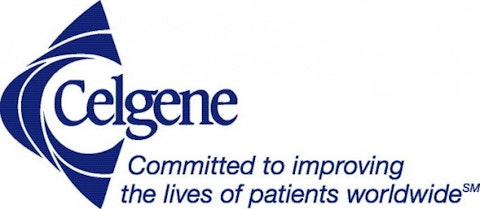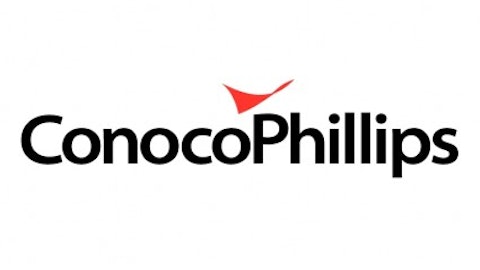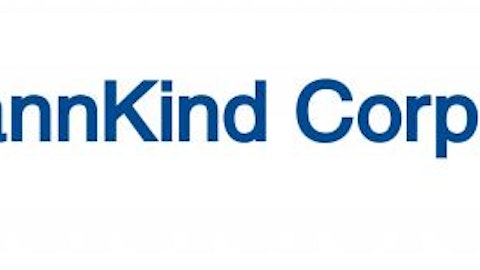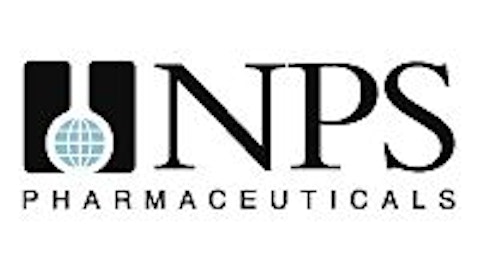A couple months may not seem like a long time, but when you’re diagnosed with pancreatic cancer, the prospect of a few months makes a huge difference. Last week, the Food and Drug Administration approved Celgene Corporation (NASDAQ:CELG)‘s Abraxane as the first new pancreatic cancer treatment in nearly eight years, giving new hope to patients and continuing a string of wins for Celgene.

Successfully commercializing cancer drugs
Many pharmaceutical companies are facing stiff headwinds tied to patent expiration, so they’re investing billions to rejuvenate pipelines. Despite those investments, few are as successful in bringing new cancer treatments to market as Celgene Corporation (NASDAQ:CELG).
Celgene’s success is rooted in Revlimid, which has been treating multiple myeloma patients since 2006. The company expects Revlimid sales will reach $4.2 billion to $4.3 billion this year, making Revlimid one of the best-selling drugs in the world. And, Celgene Corporation (NASDAQ:CELG) thinks Revlimid may have additional opportunity as a treatment for Hodgkin’s lymphoma, non-Hodgkin’s lymphoma, and chronic lymphocytic leukemia, too.
While Revlimid is a dominant player in cancer treatment, Celgene Corporation (NASDAQ:CELG) has another potential blockbuster in Abraxane, a drug acquired when Celgene bought Abraxis for $2.9 billion in 2010.
Celgene Corporation (NASDAQ:CELG) wasted little time advancing new indications for Abraxane through clinic, and those investments are paying off with an approval for non-small-cell lung cancer last fall and pancreatic cancer last month.
Abraxane’s opportunity in lung cancer
Abraxane received approval as a treatment for non-small-cell lung cancer last October, opening up a new patient pool worth millions in additional sales.
The non-small-cell lung cancer indication represents 85% of all lung cancer cases and as many as 150,000 deaths each year. Unfortunately, there are more than 228,000 new cases of lung cancer diagnosed each year.
For those diagnosed, Abraxane brings new hope. In phase 3 trials of Abraxane as a treatment for advanced non-small-cell lung cancer; overall survival was 19.9 months for those over 70 years old, versus 10.4 months for Bristol-Myers Squibb Co (NYSE:BMY)‘s Taxol. The overall response rate for Abraxane was 33% versus 25% for Taxol.
Abraxane’s success in non-squamous histology patients also compares favorably. Overall survival for Abraxane in these patients was 13.9 months for adenocarcinoma and 12.4 months for large cell carcinoma, besting Taxol and matching up favorably against Eli Lilly & Co. (NYSE:LLY)‘s Alimta’s data as well, but that was from a different trial so direct comparisons aren’t completely fair. Still, those results suggest millions in potential market share gains given that Alimta generated U.S. sales of $305 million in the second quarter.
Importantly, since Abraxane isn’t combined with cremophor to solubolize the drug, Abraxane has an advantage over Taxol as patients can be treated with larger doses and suffer fewer side effects.
These advantages seem to be paying off with Abraxane sales climbing over the past three quarters.
In the fourth quarter of 2012, Celgene Corporation (NASDAQ:CELG)’s Abraxane sales were $106 million, bringing full-year sales to $427 million. In Q1 — the first full quarter following the approval for breast cancer — sales improved to $123 million, up 18% from a year ago. And momentum continued in Q2, with Abraxane sales climbing 41% year-over-year to $155 million.
Abraxane’s pancreatic cancer opportunity
Last November, Celgene reported that Abraxane when combined with current go-to pancreatic cancer drug gemcitabine significantly improved pancreatic cancer survival rates. Gemcitabine was previously sold by Eli Lilly & Co. (NYSE:LLY) as the blockbuster drug Gemzar prior to patent expiration and is now sold by generic manufacturers, including Teva Pharmaceutical Industries Ltd (ADR) (NYSE:TEVA).
In Celgene’s MPACT phase 3 study, Abraxane, coupled with gemcitabine, increased overall survival to 8.5 months, versus 6.7 months for gemcitabine alone. Progression-free survival was 5.5 months, compared to 3.7 months for gemcitabine.
Those results prompted Celgene to file a supplemental NDA with the FDA for the indication earlier this year. The FDA granted the application priority review status and approved the drug less than a year after Celgene presenting the data last fall. The company also has a filing pending for approval in Europe for the disease.
Importantly, the FDA approved Abraxane as a first-line treatment for pancreatic cancer, and the patient pool approved represents 95% of cancers of the pancreas.
The final take
Celgene already has a blockbuster in Revlimid, and Abraxane may have billion dollar potential. The drug’s winning ways may not be over given that the company is studying Abraxane as a treatment for metastatic melanoma.
In phase 3 data presented last November at the Society of Melanoma Research meeting, progression-free survival on Abraxane was 4.8 months versus 2.5 months for patients on dacarabzine. If the drug eventually gets approval for this indication, it will compete with Bristol-Myers Squibb Co (NYSE:BMY)’ Yervoy and Roche‘s Zelboraf. That could be another big market for Abraxane given that Yervoy generated $233 million in sales during Q2 and Zelboraf had sales of $245 million in 2012.
In the meantime, non-small-cell lung cancer and pancreatic cancer approvals offer significant revenue growth given Abraxane’s $6,000-$8,000 a month price tag. Knowing the unmet need Abraxane addresses and the margin friendly pricing, you may find that Celgene’s tailwinds make it a profit-friendly investment over the coming year.
The article 1 Drug Dramatically Reshaping Pancreatic Cancer Treatment originally appeared on Fool.com and is written by Todd Campbell.
Todd Campbell has no position in any stocks mentioned. The Motley Fool recommends Celgene.
Copyright © 1995 – 2013 The Motley Fool, LLC. All rights reserved. The Motley Fool has a disclosure policy.





